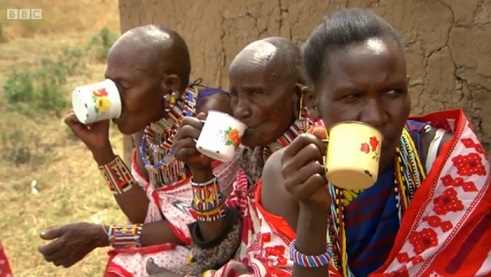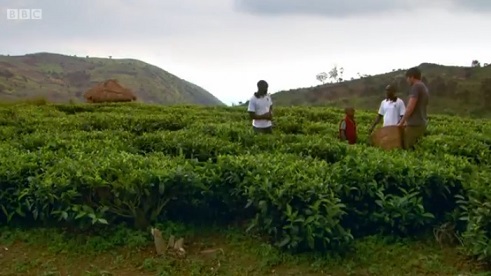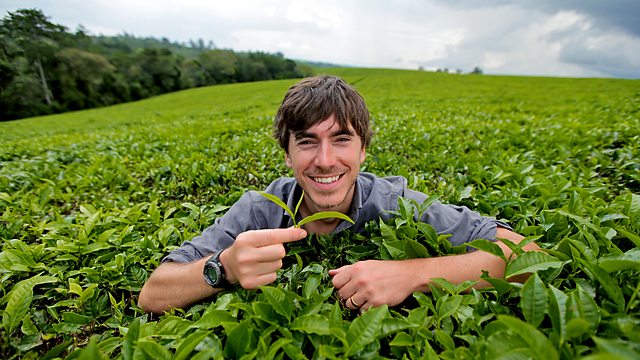Everybody loves a nice ‘cuppa’ tea, whether it be the wake-up call in the morning or the de-stress beverage at night, and it has become a huge part of British Society. However, whilst drinking your tea do you question where it has come from or how many hands it has passed through to make it into your cup? A BBC programme last week followed the journey of tea through east Africa, from the picking to the auctioning. This World: The Tea Trail With Simon Reeve revealed the tea industry’s history and the link to Britain, the journey on the road and some stark realities of the industry. How many of these realities go unnoticed as Britain enjoys its tea? Do people really know where their tea comes from?
Firstly, East Africa grows the most tea for Britain according to recent statistics: growing over half of the amount of tea drunk in Britain. Between 1900 and 1930 tea exportation grew, each year 200 tonnes of tea being exported, and now, in 2014, Kenya is the largest tea exporter in the world. So how did this come to be? The answer lies within Kenya’s history. in 1902 Kenya was declared a British colony, and this saw many white settlers move to Kenya to start a new life. In 1903, tea seeds were brought over with British settlers which saw the growth of tea in Britain… A family from Essex becoming the 1st Kenyan tea grower! The development of the tea trade within Kenya saw the natives very badly treated, many being moved out of prosperous land so that white settlers could move in. By 1943 there were 16,000 acres of tea plantations controlled by colonial rule. By the 1950’s, native Kenyans had had enough of being controlled by strict colonial rule and revolted: now known as the Mao Mao revolt. British settlers farming tea were targeted and many British families were killed. British rule resorted to violence, camps and torture: between 1952 and 1960, 10,000 Kenyans were held, many without charge, and were tortured, raped and mutilated.. Simply for trying to reclaim the land that was already theirs.
However in 1963 independence came, and Kenya began growing its own tea on its reclaimed land. Many tea farmers have small land holdings and around 5 million are employed through the tea industry in Kenya. The tea industry not only has an effect upon Kenyan society, but also upon the Masai Mara tribe. This tribe is known for living a traditional life in the African plains revolved around cattle, which is their main income and way of life. However, this is beginning to change. Due to the climate within East Africa the Masai Mara can no longer depend on Cattle, the ownership of which has decreased due to drought. The Masai Mara has begun to use agriculture as a way of life: one of the crops they farm being tea, which is now used within the Masai Mara’s rituals, something you perhaps wouldn’t expect. As Simon Reeve explained, tea is the future for the Masai – they are not losing their culture, but developing it due to the changes of climate around them.

Have you ever considered the idea of your cup of tea being linked to the HIV aids epidemic within East Africa? Well, as This World brought to light, it is. The tea we drink has to travel across East Africa, usually via truck. Many of these trucks cannot travel over the hills by night due to bandits, and so stop at a truck stop for the night. Reeve explores the area of Salgaa, a place that has developed into a small town due to these nightly stops by truckers. 600 trucks stop in the area a night, which now has a population of 7,000 with around 2,000 of these people being prostitutes. Many truckers use the sex workers, and often have unprotected sex. East Africa has had the worst HIV aids epidemic in the world and these truckers are the major spreader of the disease. Never considered that whilst drinking your tea, I bet!
A final point made in the programme was on labour, and how when it comes to international industries labour plays a major role in human rights abuses. After the independence of Kenya, many British and European companies stayed within the country to produce tea. A well known brand, Unilever, is still there today – the company that provides us with PJ tips – and claims to pay its workers more than twice the national basic wage. The company runs the tea plantation similarly to how they were run in colonial times, 50,000 people are employed who work and live on 50 squared miles of land – they are entitled to free health care and education for their family. However, life as a tea picker is not as easy as Unilever makes out; as well as being a physically demanding job, many workers only earn enough to feed themselves that day. A picker gets paid 11 shillings per kilogram, and on average a picker can pick 15 kilograms a day, which equates to earning them just over a pound a day. Many of the pickers are female and the supervisors male, often leading to issues of sexual harassment – many women struggling within the work place at the hands of their supervisors. As reported by Simon Reeve, women’s complaints often fall short due to the supervisors being a relative of the manager, meaning the women can ask for no help from higher authorities. These are all common stories, and most plantations are the same; the only alternative for these women being prostitution, as there are no other jobs. In hearing such stories, one may feel the need to stop buying such products in order to help these women, but a plain message from one of the female workers rings out: ‘Don’t worry about our suffering. We know if you buy our tea we get our wages, if you stop drinking our tea then we will suffer’.

Not only the women are suffering, however, but Children are as well. The BBC’s Tea Trail leads us to Toro in Uganda. Uganda is a terribly poor country with a quarter of the population living on less than one pound a day, and again tea has a vital role to play. Uganda is prominent for its use of child labour, with two million children working in agriculture, many in the tea industry. Often orphans, having lost their parents to HIV and aids, these children work to survive and they cannot afford food, let alone school fees. A child interviewed by Simon Reeve was a ten year old boy called Abele, who lives on one meal a day and works out on the tea plantations. He earns twenty five pence a day and though his dream is to become a doctor the local school fees are too expensive. The tea industry isn’t helping him in any way, but instead trapping him. Regrettably, there is no short term solution, and until food, medicine and education are provided, children will continue to work in the fields.
This World: The Tea Trail With Simon Reeve has been a real eye opener, revealing the importance of the tea industry and the effect it has internationally. Tea has developed and given countries an industry, albeit not having an entirely positive effect on all those involed. The tea industry is changing cultures and traditions of East African tribes. Tea has an impact on the epidemic of HIV and aids, and though it is employing thousands of people it is also trapping thousands, restricting economic growth. Maybe next time, whilst having a quick ‘cuppa’, think of its journey, who has picked it for you, who has transported it for you and in many cases who is missing out on going to school for your tea. Tea, I think we’ve found, has a lot of questions to answer.
Catch This World: The Tea Trail With Simon Reeve on BBC iPlayer until 19th Jan here.
Like this article? Then why not sign up to Fortitude Magazine’s Weekly Round Up! Our pick of the week’s best news, reviews, videos and music straight to your inbox. Click here to sign up today!

